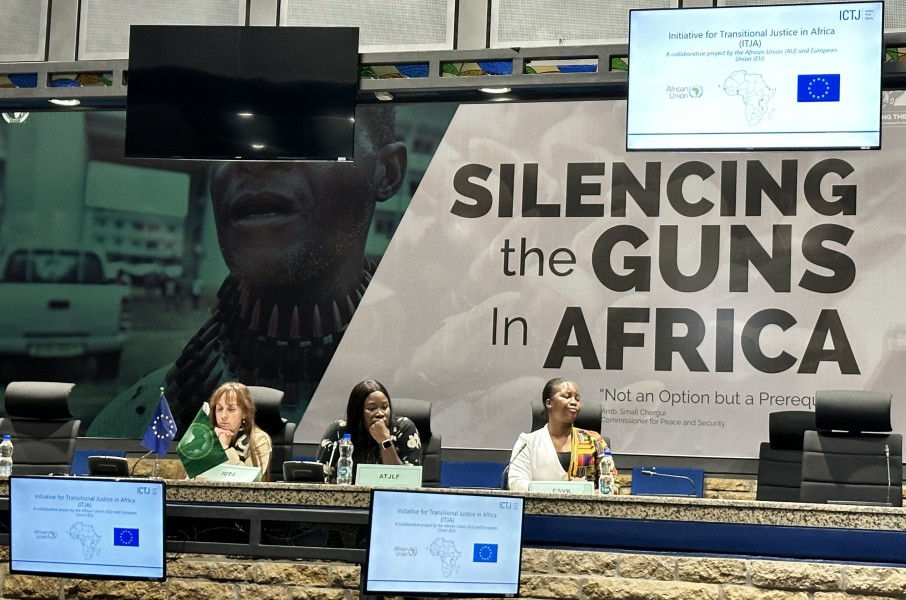On October 25, the African Union (AU) and European Union (EU) officially launched their joint Initiative for Transitional Justice in Africa (ITJA) at the AU’s headquarters in Addis Ababa. The initiative seals a long-running policy agreement between the AU and the EU and opens a new chapter in the cooperation between these two regional organizations in the fields of democratic governance and human rights. Funded by the EU, the project will take place over a three-year period and will promote national transitional justice processes in Africa, in line with the AU Transitional Justice Policy (AUTJP) and its roadmap. A consortium of civil society organizations will work alongside the AU and its member states to implement it. The consortium comprises ICTJ, who will also lead it, the African Transitional Justice Legacy Fund (ATJLF), and the Centre for the Study of Violence and Reconciliation (CSVR). Together, these three organizations combine extensive experience with transitional justice processes on the African continent and across the globe, a deep understanding of the local contexts in the countries of concern, and strong ties with the AU and EU.
The ITJA has several unique features that, if embraced and advanced by all actors, have the potential to trailblaze a new and inspiring path to peace, justice, and sustainable development on the African continent. Firstly, the two regional organizations behind the initiative have themselves adopted policies on transitional justice. They are in fact the first and only regional bodies to do so. Whereas the EU Policy Framework on Transitional Justice is outward looking and intertwined with its foreign policy, the AUTJP is inward looking and aspires to deliver justice to victims of human rights violations in Africa, a powerful and ambitious objective. With the ITJA, the AU and the EU jointly commit to promote peace, justice, and inclusiveness—which coincides with Sustainable Development Goal (SDG) 16—through a robust multi-actor alliance—which relates to SDG 17. If successful, this collaboration could inspire other similar inter-regional alliances elsewhere in the world.
Secondly, the ITJA will create the first official database of African transitional justice experts. As one of the project’s main components, the database is intended to foster the development of expertise and knowledge management in Africa by serving as a lasting resource and as a regionally owned and managed network of experts that will outlive the initiative and have continuous impact for years to come.
Thirdly, as part of the ITJA, the consortium will organize several key annual events on transitional justice, such as the African Transitional Justice Forum and the EU-AU Experts Seminar on Transitional Justice, under the same umbrella. In doing so, the consortium will help strengthen the collaboration and coordination among the multiple actors involved in these events and contribute to more consistent and coherent engagements and commitments from one year to the next.
Lastly, the ITJA takes a consistently victim-centered approach and operates on two complementary tracks: the institutional and multilateral track focused on partnerships with the AU, EU, the African Regional Economic Communities, and member state governments and institutions, and the local and grassroots track focused on engaging with and empowering African civil society organizations, victims’ groups, and local media. The purpose is to create synergies among stakeholders in the two tracks and build shared trust and commitment to deliver justice to victims and lay the foundation for a more peaceful and sustainable future on the continent.
Above all, the ITJA seeks to equip the AU and its member states with expert knowledge and tools related to transitional justice to support them on their journey to justice and redress for victims of massive human rights abuses. That said, the choice to engage in the opportunities the initiative offers rests with the AU and member state governments, as well as with civil society organizations and other local actors.
___________
PHOTO: Anna Myriam Roccatello (ICTJ), Juliet Ugwu (ATJLF) and Annah Moyo (CSVR) participate in a panel discussion at the ITJA launch event in Addis Ababa on October 25, 2023. (ICTJ)

